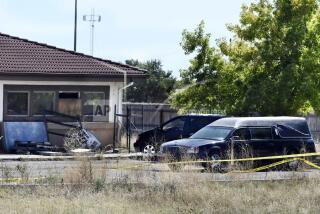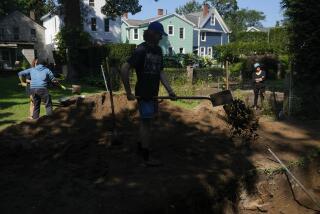4 New Vaults Full of Bodies Found at Ga. Crematory
NOBLE, Ga. — The ghoulish discoveries at a rural crematory worsened Monday when incredulous investigators opened four steel vaults packed with more bodies.
By nightfall Monday, the remains of 139 bodies had been collected, and investigators feared that upward of 200 more may be unaccounted for.
Because some of the remains appear between 10 and 20 years old, authorities said Monday they need to speak with Ray Marsh, who started Tri-State Crematory about 27 years ago before turning it over to his son in 1996. But the elderly Marsh’s health is too poor at this time to withstand questioning, they said.
The macabre mystery is all the more stunning for residents in this everyone-knows-everybody burg because the Marsh family was well-regarded in the community.
Marsh is known here as a successful entrepreneur who once operated a heavy equipment business and lumber mill. He got into the business of death about 30 years ago because he had a backhoe, and a friend asked him to dig some graves.
One thing led to another; Marsh became a professional gravedigger, and began constructing metal vaults to protect interred caskets. Then he opened the crematory, charging funeral homes from $200 to $300 to incinerate each body. A few years ago, he opened a cemetery, Marsh Memorial Gardens, just down the street in this unincorporated town of about 300.
“Mr. Marsh was so generous,” said Barbara Berry, the Walker County elections clerk. “My aunt was buried in Marsh cemetery, and we didn’t have to pay anything.”
On corporate papers, Ray Marsh’s wife, Clara, is listed as secretary-treasurer, but investigators said Monday they don’t believe she was involved in the daily operations of the family business.
Until her retirement, Clara Marsh was a lifelong local teacher, loved by the community. In 1995 she was named the Walker County Citizen of the Year for her work in education.
Detectives do want to interrogate the couple’s 28-year-old son, Brent, who took over the crematory in 1996 after his father fell ill.
The younger Marsh, who earlier cooperated with investigators, is being held without bail in the county jail. He was arrested Saturday, released on bail Sunday and arrested again late Sunday night when more bodies were found. He may be arraigned as early as today on 17 felony counts of theft by fraud for allegedly taking 17 bodies for incineration but not performing the service. Each count carries a one- to 15-year prison sentence.
Brent Marsh, said those who know him, seemed destined for great things in the local business community, an “up-and-comer.” He attended the University of Tennessee at Chattanooga, about 30 miles to the north, on a football scholarship, and returned home just in time to take over the crematory.
He plunged into civic affairs as well. He is active in his church and serves on the citizens committee that oversees the county’s Department of Family and Children’s Services, helping advise on matters of welfare payments and the foster children program. He also sits on the tax equalization board, helping resolve property tax disputes.
The Marshes’ reputation began unraveling Friday with the discovery of a skull on the crematory’s 16 acres.
Investigators said Monday they were awaiting the arrival of a forensic anthropologist to empty the contents of the four vaults found Monday. Other bodies have been discovered stacked in a storage shed and in a fifth vault found Sunday. Bones have been found scattered across the grounds.
Of the 139 body remains recovered so far, 27 have been identified. Earlier estimates put the number of discarded bodies at 200, but authorities now fear the number may be much greater. Just since 1996, 350 bodies had been delivered to Tri-State Crematory, according to records from funeral homes in northern Georgia, southern Tennessee and eastern Alabama.
Investigators are now asking the funeral homes to search records before 1996.
At a news conference Monday, Dr. Kris Sperry, the state’s chief medical examiner, said that all five vaults--each about 7 feet long, 4 feet wide and 4 feet tall--were filled to the brim with human remains.
“I can’t even begin to guess how many bodies may be in those vaults,” Sperry told reporters. “The volume of what we’re finding is growing by the hour.”
The only explanation offered so far by Brent Marsh, according to investigators: The incinerator was broken.
By Monday, more than 400 people were assigned to the investigation. They included grief counselors meeting with families who have learned that treasured urns contained only concrete dust, as well as detectives scouring the grounds and neighboring properties for more evidence.
Some of the remains will never be identified, Sperry said. “It’s not like a plane crash where . . . you know the names of each one” of the victims, he said.
Even determining the sheer number of bodies that were left to rot outside the crematory is “an enormous problem,” Sperry said, because of the helter-skelter way bones seem to have been discarded. “It’s like taking 100 jigsaw puzzle pieces, and pouring them on the ground upside down,” he said.
Confounding the investigation, investigators said, is that the crematory has no records before last October. The business, which apparently had no outside employees, was not licensed by the state. Former coroner Bill McGill filed a complaint in 1995 to state officials. Nothing came of it, McGill said Monday.
The crematory’s troubles seemed to touch virtually everyone living in northern Georgia’s Walker County.
Retired dairyman Willie Haslerig, 80, considers himself a good family friend. Just a couple of weeks ago--before all of this--he had stopped by the home to check on the elder Marsh. “They’re a nice bunch of working people,” he said.
Of the son: “He’s a young fellow, quiet, but he was on his way up in the world. I respected him a whole lot, and I figured he was a clean businessman until this thing exploded. And now I’m caught up in the middle of this,” Haslerig said. “My sister was cremated by him two years ago, and now hers might be one of the bodies.”
Roger Neal, who serves with the younger Marsh on the board overseeing family and children’s services for the county, said that all outward appearances suggested that the crematory was operating without problems.
“I’d be with him at least once a month, and everything seemed all right,” Neal said. “He had good vehicles, dressed well. Things were going pretty good, apparently.
“So we’re all stunned,” Neal said. “We’re having a hard time dealing with this.”
McGill, who served as county coroner from 1977 to 2000, said despite his complaint he had no reason to suspect the crematory wasn’t going about its business. He had visited the facility once, about 10 years ago.
McGill said he wasn’t surprised that neighbors apparently detected no foul odors from the property. Most of the remains were underground, inside sealed vaults or inside the closed metal storage shed, and “you won’t get much odor until you disturb them,” he said.
The incinerators used by crematories cost upward of $30,000, said Jack Springer, spokesman for the Cremation Assn. of North America.
Tri-State Crematory, he said, is not among its 1,200 members.
“There are lots of people who can fix incinerators,” he said. “If [the Marshes’ incinerator] wasn’t working, why did [Brent Marsh] accept bodies? I can’t believe that, for all these years, the funeral homes that were sending him bodies didn’t, at an unannounced time, check out his operation.”
More to Read
Sign up for Essential California
The most important California stories and recommendations in your inbox every morning.
You may occasionally receive promotional content from the Los Angeles Times.










